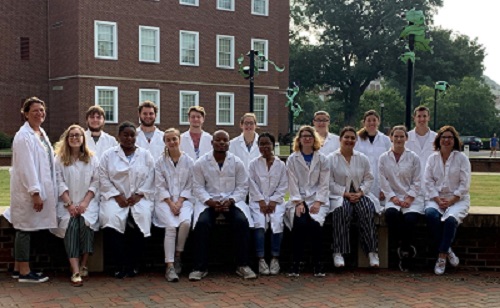
After two successful applications to the Howard Hughes Medical Institute, Winthrop has become a member of a select group of schools around the country taking part in both the SEA-PHAGES research project, and the new and exciting next phase; SEA-GENES. Biology faculty members Dr. Vicky Frost (microbiology) and Dr. Kristi Westover (bioinformatics) lead the initiative. Dr. Kathryn Kohl (genetics) joins Dr. Frost in co-instructing the GENES research, and Dr. Julian Smith directs the TEM imaging of the viruses. Participating in the “SEA” is an exciting opportunity for Winthrop students, our faculty and institution to be part of a nationally acclaimed and much-admired program.
The SEA Phage Hunters Advancing Genomics and Evolutionary Science, or PHAGES, project is built around a national experiment in bacteriophage genomics. Students isolate, name, sequence, and analyze newly discovered bacteriophages (viruses) that infect bacteria living in the local soil. Students make significant contributions to the field of genomics as they “learn how to think like scientists” https://www.hhmi.org/science-education/programs/science-education-alliance. The national study was established in 2008 and is led by Professor Graham Hatfull as part of the Howard Hughes Medical Institute's (HHMI) Science Education Alliance (SEA). There are now more than 100 different colleges and universities in the cohort across the USA with thousands of undergraduates having experienced laboratory research as freshmen scientists.
This is a research program specifically aimed at first-year science majors with little or no background in college level biology as an alternative to the traditional introductory biology lab course. PHAGES is a two-semester course, which exposes students to a number of laboratory experiences such as molecular biology, microbiology, microscopy and bioinformatics - all fundamental skills for the modern scientist. Winthrop's first-year biology students are offered immediate hands-on involvement in genuine research.
SEA-GENES is the next (and new!) exciting step in the HHMI sponsored SEA research experience. This is an additional genuine research driven course where the PHAGE students go back to the bench to investigate the gene function of phages. During their investigations, students use genetic engineering, molecular cloning, phenotypic assays and phage protein/host protein interaction analyses.
The intention is to motivate and engage this group of students as well as encourage them to continue in the field of science. Our students make exciting novel discoveries as well as contribute meaningfully to the body of scientific knowledge. Students and faculty gain the opportunity to present their research, network with other SEA members around the USA as well as be co-authors on peer-reviewed publications. The results are shared online with the research community, and published in the National Center for Biotechnology Information GenBank database.
Incoming freshmen who are interested in research and who are highly motivated to learn hands-on laboratory techniques and computer skills that are sought after in the field of science. Students must be prepared to commit to a yearlong program of PHAGE research, followed in the fall by the mentoring of new incoming freshmen PHAGE students, and then completion of the CRE (Course Research Experience) with the spring semester GENES project. The CRE concludes with in an accumulation of 8 hours of degree credit in authentic research.
Incoming freshmen must formally apply using the course SEA-PHAGES/SEA-GENES application form (PDF - 119KB)
All students who apply are considered based upon their SAT/ACT scores, and/or high school GPA, personal statement and commitment to the program.
Lab Fees: $150/wet lab (wet labs only, no addition fee for the in silico Bioinformatics lab, plus all manuals are included)
Students work on their research projects under the guidance of two faculty members. You will leave the course with hands-on experience using techniques and tools of microbiology, molecular genetics, genetic engineering, electron microscopy and state-of-the-art bioinformatics computer programs. You will be creating novel data and contributing to our knowledge about bacterial viruses. As a freshman, you will be part of a national network of scientists, collaborating and sharing scientific knowledge. You could have the opportunity to attend regional SEA/HHMI seminars as well as the national seminar. Students may be contributing authors on a nationally or internationally renowned journal. You will have valuable and sought-after research experience in your first two years at Winthrop.